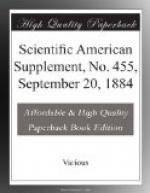flaming waste immediately ignites without any explosion
whatever; after which the quantity of fuel can be increased
at pleasure. By looking at the top of the chimney,
the supply of petroleum can be regulated by observing
the smoke. The general rule is to allow a transparent
light smoke to escape, thus showing that neither too
much air is being admitted nor too little. The
combustion is quite under the control of the driver,
and the regulation can be so effected as to prevent
smoke altogether. While running, it is indispensable
that the driver and fireman should act together, the
latter having at his side of the engine the four handles
for regulating the fire, namely, the steam wheel and
the petroleum wheel for the spray injector, and the
two ash-pan door handles in which there are notches
for regulating the air admission. Each alteration
in the position of the reversing lever or screw, as
well as in the degree of opening of the steam regulator
or the blast pipe, requires a corresponding alteration
of the fire. Generally the driver generally passes
the word when he intends shutting off steam, so that
the alteration in the firing can be effected before
the steam is actually shut off; and in this way the
regulation of the fire and that of the steam are virtually
done together. All this care is necessary to prevent
smoke, which is nothing less than a waste of fuel.
When, for instance, the train arrives at the top of
a bank, which it has to go down with the brakes on,
exactly at the moment of the driver shutting off the
steam and shifting the reversing lever into full forward
gear, the petroleum and steam are shut off from the
spray injector, the ash-pan doors are closed, and if
the incline be a long one, the revolving iron damper
over the chimney top is moved into position, closing
the chimney, though not hermetically. The accumulated
heat is thereby retained in the fire-box; and the steam
even rises in pressure, from the action of the accumulated
heat alone. As soon as the train reaches the
bottom of the incline and steam is again required,
the first thing done is to uncover the chimney top;
then the steam is turned on to the spray injector,
and next a small quantity of petroleum is admitted,
but without opening the ash-pan doors, a small fire
being rendered possible by the entrance of air around
the spray injector, as well as by possible leakage
past the ash-pan doors. The spray immediately
coming in contact with the hot chamber ignites without
any audible explosion; and the ash-pan doors are finally
opened, when considerable power is required, or when
the air otherwise admitted is not sufficient to support
complete combustion. By looking at the fire through
the sight hole it can always be seen at night whether
the fire is white or dusky; in fact, with altogether
inexperienced men it was found that after a few trips
they could become quite expert in firing with petroleum.
The better men contrive to burn less fuel than others,
simply by greater care in attending to all the points




